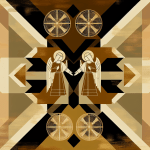Importance of Catholic Festivals Like Corpus Christi
The Catholic Church is rich in traditions and celebrations, with festivals playing a vital role in community life, spiritual reflection, and cultural expression. Among these festivals, Corpus Christi stands out as a significant feast that celebrates the real presence of Jesus Christ in the Eucharist. Understanding the importance of Catholic festivals like Corpus Christi offers insight into Catholic beliefs, community bonding, and the deep-rooted customs that enrich the spiritual lives of the faithful. This post explores the significance of Corpus Christi and other Catholic festivals, their historical background, and their impact on communities around the world.
The Significance of Corpus Christi
A Celebration of the Eucharist
Corpus Christi, which means “Body of Christ” in Latin, is a festival that honors the real presence of Jesus in the Holy Eucharist. Instituted in the 13th century by Pope Urban IV, this feast highlights the Catholic belief that during the Mass, bread and wine become the actual body and blood of Christ. This transformation is central to Catholic faith, representing a profound mystery that forms the foundation of Catholic worship.
The importance of Catholic festivals like Corpus Christi lies in their ability to affirm and express these core beliefs in a communal setting. As Catholics gather to celebrate, they engage in the sacred remembrance of Christ’s sacrifice, reinforcing their faith and dedication to the teachings of the Church.
Historical Context
The origins of Corpus Christi can be traced back to visions experienced by St. Juliana of Liège, who advocated for the establishment of a feast dedicated to the Holy Eucharist. The Church officially adopted the feast in 1264, and it was celebrated with great fervor, emphasizing the significance of the Eucharist in Catholic life. The festival is celebrated on the Thursday after Trinity Sunday, although in many countries, it is observed on the following Sunday.
Understanding the historical context of Corpus Christi allows Catholics to appreciate the evolution of their practices and the enduring significance of the Eucharist as a source of spiritual nourishment and communal identity.
The Rituals and Traditions of Corpus Christi
Eucharistic Processions
One of the most striking aspects of the Corpus Christi festival is the Eucharistic procession. During this solemn event, the Blessed Sacrament is displayed in a monstrance, and participants walk through the streets, often accompanied by songs, prayers, and hymns. These processions are not only a public affirmation of faith but also a means to evangelize and demonstrate the importance of the Eucharist to the larger community.
The act of walking through neighborhoods with the Eucharist creates a vibrant display of faith and serves as a reminder of Christ’s presence in the world. For many, witnessing or participating in these processions is a deeply moving experience that reinforces their spiritual connection to God and the Church.
Altars and Decorations
Another captivating tradition associated with Corpus Christi is the creation of altars and decorations along the procession route. Often adorned with flowers, cloth, and religious symbols, these altars serve as focal points for prayers and blessings. Local communities come together to prepare these displays, fostering a sense of unity and collaboration while enhancing the cultural richness of the celebration.
Symbolic decorations may include the use of wheat and grapes, representing the elements of the Eucharist. This artistic expression allows participants to engage with the faith visually and spiritually, deepening their understanding of the significance of the Eucharist.
Wider Impact of Catholic Festivals
Strengthening Community Bonds
Catholic festivals like Corpus Christi go beyond religious observance; they serve as essential community-building events. These celebrations bring people together, fostering relationships and reinforcing communal ties. Whether through shared meals, collaborative decorations, or collective prayers, festivals create an environment where individuals feel a sense of belonging and support.
In many cases, festivals also invite participation from the wider community, including those who may not be practicing Catholics. This inclusivity can help bridge gaps between different groups, fostering mutual understanding and respect.
Cultural Heritage and Identity
Catholic festivals, including Corpus Christi, also play a crucial role in preserving cultural heritage and identity. Many of these celebrations are rooted in local customs and traditions, reflecting the unique history and values of the communities that celebrate them. This cultural aspect enriches the spiritual experience and emphasizes the interconnectedness of faith and tradition.
Local variations of Corpus Christi may feature unique rituals, music, and artistic expressions that reflect the cultural diversity within the global Catholic community. Celebrating these festivals allows Catholics to pass down traditions, connecting generations and maintaining a sense of identity in an ever-changing world.
Promoting Social Justice and Charity
In addition to their spiritual and cultural significance, Catholic festivals often prompt outreach and charitable activities. Many communities use these celebrations as opportunities to raise awareness about social justice issues and to engage in acts of charity. For instance, food drives, fundraising efforts, and community service projects may be organized in conjunction with the festival, demonstrating the Church’s commitment to serving those in need.
By actively engaging in social justice, festivals like Corpus Christi extend their impact beyond the religious sphere, inspiring individuals to live out their faith through actions that promote love, compassion, and support for the marginalized.
The Role of Festivals in Cultivating Faith
Deepening Personal Spirituality
Participating in Catholic festivals can significantly enhance an individual’s spiritual life. These events provide opportunities for reflection, prayer, and a renewed commitment to faith. In the case of Corpus Christi, the emphasis on the Eucharist invites Catholics to contemplate the mystery of Christ’s presence and its implications for their daily lives.
Moreover, attending communal celebrations fosters a shared experience of faith that can be empowering. Engaging with fellow believers cultivates a sense of accountability and encouragement, which may inspire individuals to deepen their personal spiritual practices.
Enriching the Liturgical Calendar
Catholic festivals also play a vital role in the liturgical calendar, marking specific seasons and themes throughout the church year. Each celebration, including Corpus Christi, enhances the overall rhythm of worship and reflection that characterizes Catholic spirituality. These festivals invite believers to immerse themselves in different aspects of their faith, from the joys of Easter to the solemnity of Lent.
This continuous engagement with different facets of faith ensures that the spiritual life remains dynamic and evolving, allowing individuals to grow in their understanding of God and the teachings of the Church.
Conclusion
The importance of Catholic festivals like Corpus Christi cannot be overstated. They are celebrations that encapsulate core beliefs, foster community, and promote cultural heritage. Through Eucharistic processions, altars, and the shared experience of faith, these festivals create a sense of unity and identity among Catholics.
Moreover, they serve as powerful tools for personal spiritual growth and outreach to those in need, highlighting the Church’s commitment to social justice. As communities continue to celebrate festivals like Corpus Christi, they not only honor tradition but also nourish their faith, strengthen their relationships, and promote a culture of love and service.
In a world that often feels fragmented, the celebration of such vibrant and communal events offers a beacon of hope and reminds us of the profound impact of faith in our lives. Whether you are a lifelong Catholic or exploring the faith, participating in these festivals can provide a deeper understanding of Catholic traditions and the enduring significance of the Eucharist in the lives of believers.




